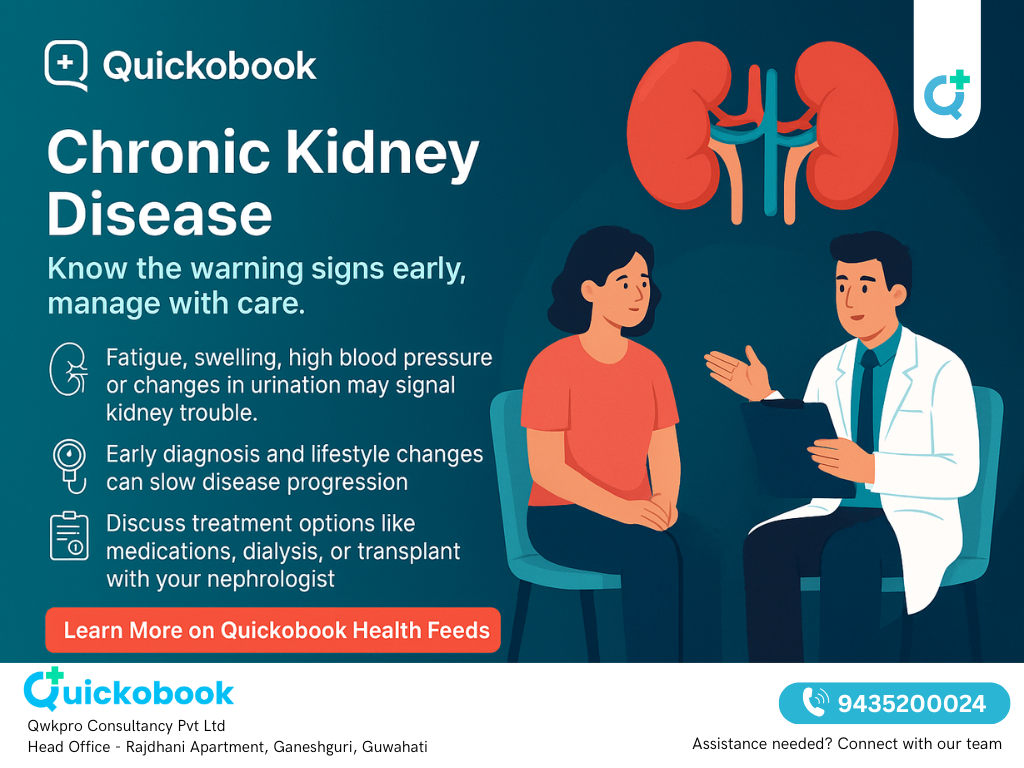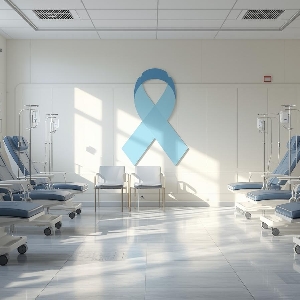Introduction: Understanding Chronic Kidney Disease
Chronic Kidney Disease (CKD) is a long-term condition in which the kidneys gradually lose their ability to filter waste and excess fluids from the blood. In India, rising cases of diabetes, high blood pressure, and unhealthy lifestyles have made CKD a growing public health concern.
According to the Indian Society of Nephrology, one in every 10 adults may have some form of kidney damage — often without realizing it. That’s why understanding the warning signs, getting timely nephrologist consultation, and using trusted platforms like Quickobook for early detection are essential steps in protecting your kidney health.
What Is Chronic Kidney Disease?
Chronic kidney disease (CKD) refers to the gradual loss of kidney function over months or years. The kidneys’ main role is to remove toxins and regulate blood pressure, red blood cell production, and electrolyte balance.
When they become damaged, waste products and fluids can build up, leading to symptoms such as swelling, fatigue, and high blood pressure.
CKD is classified into five stages depending on how well the kidneys are working (measured by eGFR – estimated glomerular filtration rate).
- Stage 1: Mild damage with normal function
- Stage 2: Slight decline in function
- Stage 3: Moderate loss of kidney function
- Stage 4: Severe loss of kidney function
- Stage 5: Kidney failure (end-stage renal disease – ESRD)
Causes and Risk Factors
The two most common causes of CKD are:
- Diabetes mellitus – High blood sugar levels damage blood vessels in the kidneys.
- Hypertension (high blood pressure) – Constant pressure weakens and scars kidney tissues.
Other contributing factors include:
- Family history of kidney disease
- Long-term use of painkillers or certain medications
- Glomerulonephritis (inflammation of kidney filters)
- Polycystic kidney disease
- Recurrent urinary tract infections
- Obesity and heart disease
Early Warning Signs of Chronic Kidney Disease
Many people do not experience symptoms until the disease is advanced. However, watch out for these early warning signs:
- Frequent urination (especially at night)
- Swelling in legs, ankles, or around eyes
- Fatigue and weakness
- Loss of appetite or nausea
- Shortness of breath
- Dry and itchy skin
- High blood pressure
- Foamy urine (due to protein leakage)
- Blood in urine
- Poor concentration or confusion
If you notice these symptoms, book a consultation with a nephrologist near you on Quickobook for timely evaluation.
Diagnosis of CKD
A nephrologist will recommend the following tests to confirm CKD:
- Blood Tests: Measure levels of creatinine, urea, and eGFR to assess kidney function.
- Urine Tests: Detect protein, blood, or infection.
- Imaging Tests: Ultrasound or CT scan to check kidney size or structure.
- Kidney Biopsy: In selected cases, a small sample is taken to study the cause of damage.
Early diagnosis is key — damage from CKD cannot always be reversed, but treatment can slow progression and prevent complications.
Treatment Options for Chronic Kidney Disease
Treatment depends on the stage and underlying cause. The goals are to:
- Control underlying diseases (like diabetes and hypertension)
- Prevent further damage
- Manage symptoms
- Delay or avoid dialysis and transplant
1. Lifestyle Modifications
- Reduce salt intake (<5g/day)
- Quit smoking and limit alcohol
- Maintain a healthy weight
- Engage in moderate exercise
- Manage blood sugar and blood pressure regularly
2. Medications
- ACE inhibitors or ARBs to control blood pressure and protect kidneys
- Diuretics to reduce swelling
- Erythropoietin (EPO) for anemia
- Vitamin D and calcium supplements for bone health
- Blood sugar control medications for diabetics
Always take medicines only under a doctor’s supervision — dosage varies from patient to patient.
READ ALSO: Kidney Stones – Causes, Symptoms, And Prevention
3. Dialysis
When kidneys can no longer function adequately (usually Stage 5), dialysis becomes necessary. There are two main types:
- Hemodialysis: Blood is filtered through a machine.
- Peritoneal Dialysis: The lining of the abdomen filters blood inside the body.
Both require strict schedules and dietary adjustments.
4. Kidney Transplant
A kidney transplant may be recommended for suitable patients. This procedure replaces the damaged kidney with a healthy one from a donor. It offers the best long-term quality of life, though lifelong medication is needed to prevent rejection.
Diet and Nutrition for CKD Patients
Diet plays a crucial role in managing CKD. A renal dietitian or nephrologist can customize a plan, but some general guidelines include:
- Limit sodium (salt), potassium, and phosphorus.
- Control protein intake (moderate—not too high or low).
- Eat more fruits and vegetables (in moderation).
- Avoid processed foods and packaged snacks.
- Stay hydrated but follow your doctor’s advice on fluid intake.
Foods good for kidney health include apples, cabbage, cauliflower, egg whites, and rice.
Preventing Chronic Kidney Disease
You can reduce your risk of CKD through simple, consistent habits:
- Control blood sugar if you have diabetes.
- Monitor and manage blood pressure.
- Stay hydrated, but avoid excessive salt.
- Avoid over-the-counter painkillers and herbal supplements without medical advice.
- Get routine kidney check-ups every 6–12 months.
Early action can prevent kidney failure and help you lead a normal, active life.
When to See a Nephrologist
Consult a nephrologist or Quickobook doctor immediately if you experience:
- Persistent swelling or puffiness
- Reduced or foamy urine
- Sudden weight changes
- Fatigue or breathlessness
- Changes in blood pressure
You can easily find and book an experienced nephrologist in your city through Quickobook.com — India’s trusted healthcare platform for verified doctors, online appointments, and teleconsultations.
Risks and Complications of Untreated CKD
Untreated CKD can lead to severe and potentially life-threatening complications such as:
- End-stage kidney failure
- Heart disease and stroke
- High blood pressure
- Anemia
- Bone weakness
- Fluid overload and swelling
- Nerve damage
Regular medical follow-up helps detect and manage these risks early.
Conclusion
Chronic Kidney Disease doesn’t develop overnight — it’s a slow process that can be managed effectively with early detection, healthy lifestyle choices, and proper treatment. Regular monitoring, maintaining good control of diabetes and blood pressure, and consulting a qualified nephrologist through Quickobook can significantly slow CKD progression and improve your quality of life.
Your kidneys silently support your body every day — don’t ignore their warning signs.
Quickobook’s CTA
Need a kidney health check-up or nephrologist consultation?
???? Book top nephrologists near you on Quickobook.com
???? Available for online and in-person consultations
???? Save time with verified doctor appointments in your city
Disclaimer
This article is for educational purposes only and is not a substitute for medical advice. Always consult a certified nephrologist or healthcare professional before starting or changing any treatment. Quickobook helps you connect with trusted doctors across India for reliable medical guidance.
FAQs (50 Expert Answers)
Q1. What is chronic kidney disease?
A. CKD is a long-term condition where kidneys slowly lose their ability to filter waste from blood.
Q2. How is CKD diagnosed?
A. Through blood tests (creatinine, eGFR), urine tests, and imaging scans.
Q3. What are the early signs of CKD?
A. Fatigue, swelling, frequent urination, and foamy urine are early warning signs.
Q4. Can diabetes cause kidney damage?
A. Yes, high blood sugar damages kidney blood vessels over time.
Q5. Who treats CKD?
A. A specialist kidney doctor called a nephrologist manages CKD.
Q6. Can CKD be cured?
A. CKD cannot be fully cured, but early treatment slows progression.
Q7. What are the main causes of CKD?
A. Diabetes, high blood pressure, and infections are leading causes.
Q8. How is CKD staged?
A. Based on eGFR levels—Stage 1 (mild) to Stage 5 (severe).
Q9. What is eGFR?
A. It stands for estimated glomerular filtration rate, a key kidney function test.
Q10. How often should kidney tests be done?
A. Every 6–12 months, especially if you have diabetes or hypertension.
Q11. What foods are good for kidney health?
A. Apples, cabbage, rice, egg whites, and cauliflower are kidney-friendly.
Q12. Should CKD patients eat less protein?
A. Yes, moderate protein helps reduce kidney strain.
Q13. What foods should CKD patients avoid?
A. Processed foods, salty snacks, red meat, and aerated drinks.
Q14. Can dehydration damage kidneys?
A. Yes, chronic dehydration can increase the risk of kidney stones and damage.
Q15. Is high blood pressure a symptom or cause?
A. Both—CKD can cause and worsen high blood pressure.
Q16. What is the best way to prevent CKD?
A. Control diabetes, blood pressure, and stay hydrated.
Q17. Can CKD cause anemia?
A. Yes, due to reduced erythropoietin production in kidneys.
Q18. How does dialysis work?
A. It filters waste from the blood when kidneys fail.
Q19. How often is dialysis needed?
A. Usually 2–3 times a week for several hours each session.
Q20. Is kidney transplant better than dialysis?
A. Transplant offers better long-term outcomes if suitable.
Q21. Can CKD cause bone weakness?
A. Yes, due to calcium and vitamin D imbalance.
Q22. What’s the average cost of dialysis in India?
A. Around ₹1,500–₹3,000 per session depending on location.
Q23. How much does a kidney transplant cost in India?
A. Typically ₹4–6 lakhs in government hospitals, higher in private centers.
Q24. Can CKD patients exercise?
A. Yes, light exercise improves circulation and overall health.
Q25. Can stress affect kidney function?
A. Chronic stress can worsen blood pressure and kidney health.
Q26. Is CKD reversible?
A. Only in early stages if the cause is treated promptly.
Q27. Can herbal medicines help CKD?
A. Only if approved by your nephrologist—avoid self-medication.
Q28. Can pregnancy worsen CKD?
A. Yes, pregnancy needs careful management under specialist care.
Q29. What are kidney-friendly drinks?
A. Water, coconut water (in moderation), and lemon water.
Q30. Can CKD cause itchy skin?
A. Yes, due to toxin buildup and dry skin.
Q31. What’s the link between diabetes and CKD?
A. Long-term high sugar damages tiny kidney filters.
Q32. How is blood pressure related to CKD?
A. Uncontrolled BP accelerates kidney damage.
Q33. Can CKD cause swelling?
A. Yes, fluid retention causes puffiness in legs and face.
Q34. What happens in Stage 5 CKD?
A. Kidneys fail and dialysis or transplant becomes necessary.
Q35. How long can CKD patients live?
A. With proper treatment, many live for decades with good care.
Q36. Can I travel if I’m on dialysis?
A. Yes, with advance planning and coordination with centers.
Q37. How can Quickobook help CKD patients?
A. It connects you to nephrologists, labs, and teleconsultations easily.
Q38. Can children get CKD?
A. Yes, due to congenital or genetic kidney disorders.
Q39. Does CKD cause weight loss?
A. Yes, due to loss of appetite and muscle wasting.
Q40. Can high protein diets cause CKD?
A. Excess protein may strain kidneys in susceptible people.
Q41. Can CKD lead to heart disease?
A. Yes, heart disease is a common complication of CKD.
Q42. Can drinking alcohol worsen CKD?
A. Yes, alcohol raises blood pressure and damages kidneys.
Q43. What’s a renal diet plan?
A. A kidney-protective meal plan designed by a dietitian.
Q44. Can CKD patients eat fruits?
A. Yes, but choose low-potassium ones like apples and grapes.
Q45. Is pain in the back a sign of CKD?
A. Sometimes, but usually CKD is painless until advanced.
Q46. What tests monitor kidney function?
A. Serum creatinine, eGFR, and urine albumin tests.
Q47. How does Quickobook help schedule nephrologist visits?
A. You can book verified nephrologists online with instant slot confirmation.
Q48. Can CKD be managed at home?
A. Early stages can be managed with diet, medicines, and doctor follow-up.
Q49. Does CKD affect urination?
A. Yes, frequency and appearance of urine often change.
Q50. Can early CKD be reversed?
A. Sometimes, if the root cause like diabetes or infection is controlled early.










Comments (0)
No comments yet. Be the first to share your thoughts!
Leave a Comment